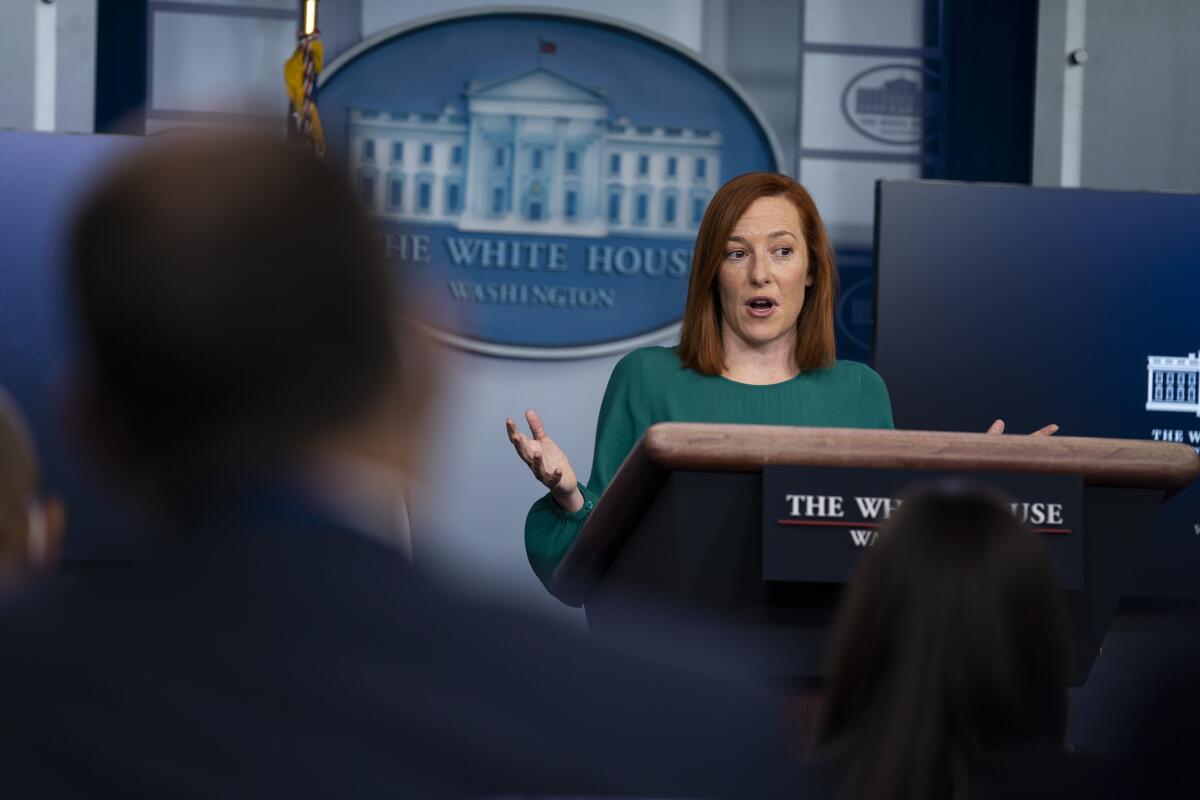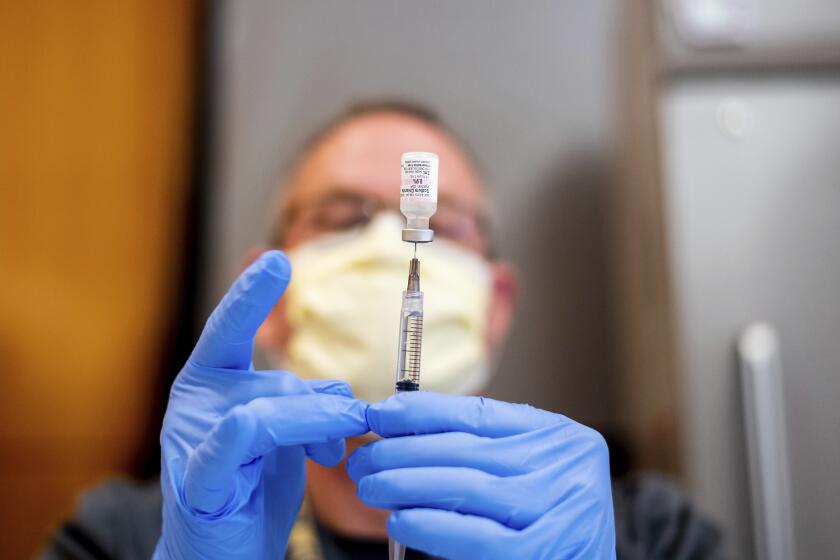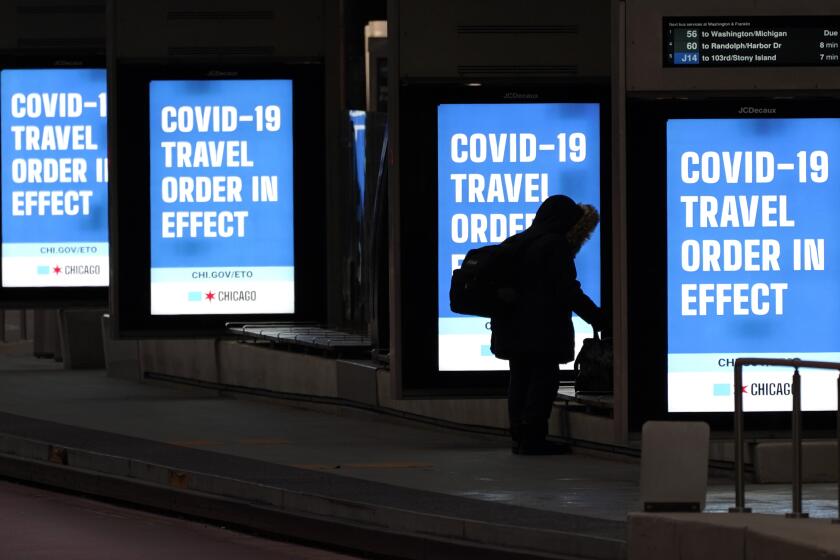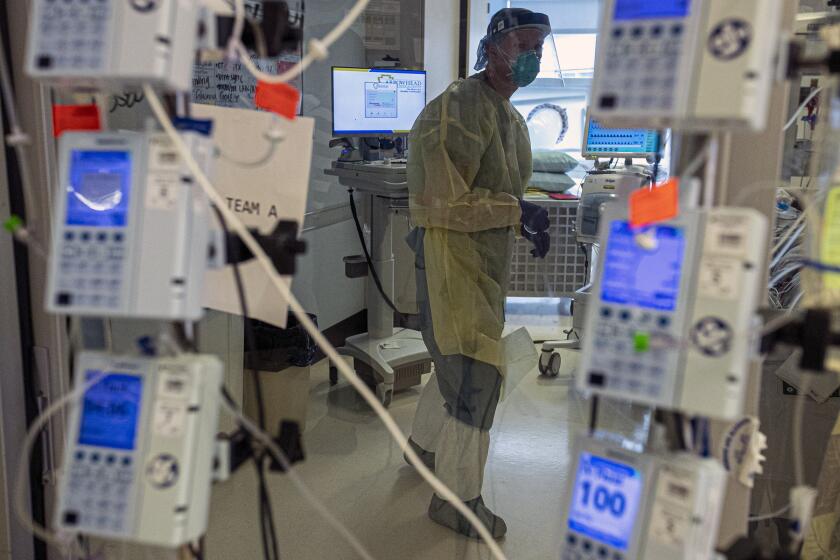Biden orders COVID-19 travel restrictions and adds South Africa to the list

- Share via
President Biden on Monday reinstated COVID-19 travel restrictions on most non-U.S. travelers from Brazil, Ireland, the United Kingdom and 26 other European countries that allow travel across open borders. He also added South Africa to the list.
White House Press Secretary Jen Psaki said South Africa was added to the restricted list because of concerns about a strain of the coronavirus that has spread beyond that nation.
“This isn’t the time to be lifting restrictions on international travel,” Psaki said.
The prohibition Biden is reinstating suspends entry to nearly all foreign nationals who have been in any of the countries on the restricted list at any point during the 14 days before their scheduled travel to the U.S.
Coronavirus mutations are on the rise. The longer it takes to vaccinate people, the more likely we’ll see a variant that eludes our tests, treatments and vaccines.
Top U.S. infectious disease expert Dr. Anthony Fauci called Biden’s decision to reinstate the travel restrictions — and expand them to include South Africa — “prudent.”
“We have concern about the mutation that’s in South Africa,” Fauci told “CBS This Morning” on Monday. “We’re looking at it very actively. It is clearly different and more ominous than the one in the U.K., and I think it’s very prudent to restrict travel of noncitizens.”
Biden reversed an order from President Trump in his final days in office that called for the relaxation of the travel restrictions as of Tuesday. Trump’s move was made in conjunction with a new requirement from the Centers for Disease Control and Prevention that all international travelers to the U.S. obtain a negative coronavirus test within three days of boarding their flight.
Last week, Biden expanded on the CDC requirement and directed that federal agencies require international travelers to quarantine upon arrival in the U.S. and obtain another negative test to slow the spread of the virus. Those requirements also go into effect Tuesday.
British scientists have bolstered their case that the new coronavirus variant spreads more easily than its predecessors. It could be worse in the U.S., they warn.
The State Department said in a statement that U.S. citizens should reconsider nonessential travel abroad, noting that access to testing in some nations remains difficult. The agency also cautioned Americans to consider ahead of international travel how they’d pay for healthcare and additional lodging costs if they became infected or hospitalized while traveling.
The 26 European countries impacted by the ban’s reinstatement are part of the border-free Schengen zone. They include Austria, Belgium, Czech Republic, Denmark, Estonia, Finland, France, Germany, Greece, Hungary, Iceland, Italy, Latvia, Liechtenstein, Lithuania, Luxembourg, Malta, Netherlands, Norway, Poland, Portugal, Slovakia, Slovenia, Spain, Sweden and Switzerland.
Biden’s team had announced that he would reimpose the travel restrictions, but the addition of South Africa to the restricted travel list highlights the new administration’s concern about mutations in the virus.
The South Africa strain has not been detected in the United States, but another strain that originated in the United Kingdom has been detected in several states.
California scientists have discovered a new coronavirus strain that appears to be propagating faster than any other variant in the Golden State.
Fauci said there is “a very slight, modest diminution” of the effectiveness of COVID-19 vaccines against those variants, but “there’s enough cushion with the vaccines that we have that we still consider them to be effective against both the U.K. strain and the South Africa strain.”
He warned that additional mutations are possible and said scientists are preparing to adapt the vaccines if necessary.
“We really need to make sure that we begin, and we already have, to prepare if it’s necessary to upgrade the vaccines,” Fauci said. “We’re already taking steps in that direction despite the fact that the vaccines we have now do work.”
More to Read
Sign up for Essential California
The most important California stories and recommendations in your inbox every morning.
You may occasionally receive promotional content from the Los Angeles Times.
















